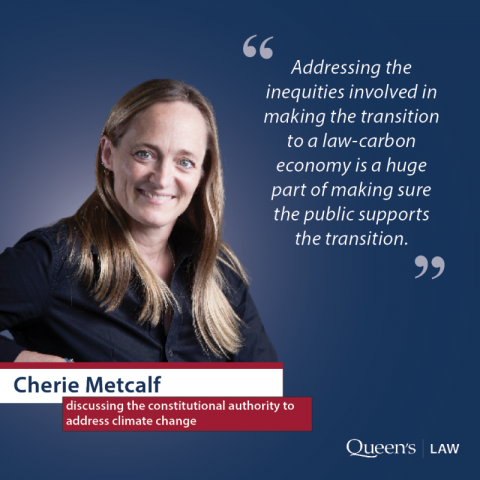
Part one of an eight-part series featuring legal insights from Queen’s Law scholars and practitioners
Climate change mitigation and adaptation are challenges needing urgent and collective action in the face of one of humanity’s greatest threats. Profound changes happening in Canada and worldwide in financial markets, securities law, accounting standards, corporate governance, trade law, insurance law, the energy industry, industrial policy, and consumer behaviour all have key roles in effectively transitioning to low-carbon economies and achieving net-zero emissions by 2050.
One legal step taken earlier this year confirms Canada’s path. In a majority decision on March 25, the Supreme Court of Canada (SCC) upheld the constitutionality of the federal Greenhouse Gas Pollution Pricing Act (GGPPA).
“The federal power to limit greenhouse gas emissions through a carbon pricing mechanism is a key policy tool to actually achieve our Paris Agreement targets,” says Professor Cherie Metcalf, a climate policy and constitutional law expert. “Without this constitutional support, it would be almost impossible to implement a national pricing scheme, and the likelihood of doing so would be extremely low, based on past experience.”
Constitutional authority to address humanity’s existential threat
Although Canada has participated in the international climate regime since its 1992 inception under the United Nations Framework Convention on Climate Change, it has a history of failing to meet its targets for reducing greenhouse gas (GHG) emissions.
In upholding the federal pricing scheme under the rarely used “Peace, Order and Good Government” power, the SCC described global warming as a matter of national concern, causing harm beyond provincial boundaries and posing “an existential threat to human life in Canada and around the world.” The Court sent a very strong signal not only to governments at all levels but to Canada’s entire population that global climate change is real and that policies to mitigate emissions and their harmful effects are in the national interest.
The ruling is also a clear message to the global community. “The SSC decision makes it easier for Canada as a federal state to assume its international commitments,” says Professor Nicolas Lamp, international trade law expert. “If the Court had ruled the GGPPA was unconstitutional, it would be hard for the federal government to make commitments, and Canada’s credibility would be damaged. Briefly put, the ruling strengthens Canada’s hand in international negotiations and credibility.”
How well the federal and provincial governments work together to take actions in response to this constitutional green light will be critical to the success of collective action.
“We can’t get to our Paris Agreement targets just by using a carbon pricing mechanism; to be successful, it has to create real incentives to transition to low-carbon technology and industries,” says Metcalf, who also specializes in law and economics and international environmental and resource law. The transition “won’t be easy” and will create winners and losers from the shift. “Addressing the inequities involved in making the transition to a low-carbon economy will be a huge part of making sure the public supports it.
“Even if we meet our Paris targets, it won’t stop climate change” she adds. “Beyond carbon pricing, there are still a lot of questions about how to achieve our mitigation and adaptation goals.”
Professor Cherie Metcalf is a climate policy and constitutional law expert, and a recipient of grants from the Social Sciences and Humanities Research Council and the Canadian Foundation for Legal Research for projects on effective climate change action and climate mitigation policy.
Professor Nicolas Lamp is an international trade law expert and co-author of Six Faces of Globalization: Who Wins, Who Loses, and Why It Matters (Harvard University Press, forthcoming).
Watch for the next stories in this series featuring our experts’ opinions on six other areas – trade, environmental, financial, insurance, Indigenous rights, and the energy sector – and their concluding remarks.
By Mark Witten